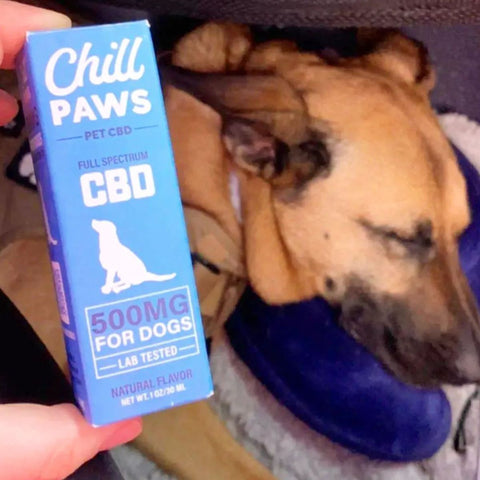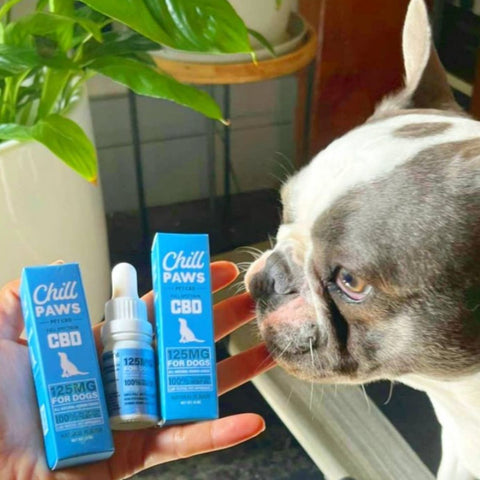Dog owners worldwide are seeking alternative ways to ensure their beloved pets live healthy, happy lives. As we explore these alternatives, we come across a wide array of natural supplements, among which CBD products for dogs have gained significant attention. One of these products that are gaining traction is CBD drops for dogs. As dog owners, we must comprehend these potential benefits, particularly for those looking for holistic remedies.

Unraveling CBD Drops for Dogs
CBD or Cannabidiol is a compound found in hemp plants, which is non-psychoactive, meaning it won't make your pet "high." Among numerous CBD pet products, cannabidiol drops for dogs offer an effective, convenient method for cannabidiol administration. When these drops interact with the endocannabinoid system in dogs, they may help maintain their overall health.
Top Five Benefits of CBD Drops
A Soothing Influence for Anxiety
One benefit that CBD chews for dogs offer is providing relief from anxiety and stress. This is particularly important as dogs can often fall prey to anxiety due to various factors such as separation from their owners, exposure to loud or sudden noises, or sudden changes in their environment, leading to discomfort and restlessness. It's of critical importance to note that while research around cannabidiol's effects on dogs is still ongoing, the initial findings have been encouraging and promising, providing a glimmer of hope in the natural management of canine anxiety.
Pain Relief and Anti-Inflammatory Effects
In addition to anxiety relief, another vital benefit offered by dog CBD chews is their potential for alleviating pain and inflammation. The compound is thought to interact with certain receptors in the brain and immune system, thereby leading to a reduction in inflammation and lessening pain. This intricate interaction could have profound implications for your pet's comfort and health, particularly if your pet experiences recurrent or chronic pain or inflammation.
The use of CBD for dogs' pain could offer a more natural, non-pharmacological alternative to traditional treatments. Its potential as a natural pain management solution offers promise for dogs who might react adversely to conventional pain medications, or for pet owners who prefer holistic approaches to pet healthcare.
Aid for Digestion and Appetite
Maintaining good nutrition is an integral component of any pet's health. Challenges can arise if your dog demonstrates a lack of interest in food. In such situations, cannabidiol products, including CBD treats for dogs, may come to the rescue. Its properties are believed to stimulate the appetite, enticing your pet to eat. It can also potentially help address certain digestive issues. This is particularly beneficial, ensuring that your canine friends absorb the vital nutrients they need for optimal health, despite their initial food aversion or digestive complications.
A Good Night's Sleep
Just like humans, quality sleep is equally crucial for our four-legged companions. Some dogs grapple with sleep disturbances, which may have adverse impacts on their overall health and well-being. Administering the compound to your dog before their bedtime could potentially offer a solution. Cannabidiol is thought to promote relaxation and aid in inducing a state of restful sleep. This could significantly improve your dog's sleep pattern, enhancing their quality of life.
Encouraging Skin Health
A considerable number of dogs suffer from skin conditions and allergies that can cause discomfort or distress. Whether it's hemp dog treats or CBD oil, it's always advisable to discuss the options and potential impacts with your vet, ensuring the safest and most beneficial course of action for your pet.
Important Considerations for CBD Use
Before you head out to find where to buy CBD for dogs, let's delve into the critical considerations when incorporating cannabidiol into your pet's routine.
Getting the Dosage Right
Understanding the correct dosage of CBD treatment for dogs is a pivotal aspect of ensuring the treatment's effectiveness and safety. The initial dosage should always be small, allowing you to observe how your dog reacts to the compound. Gradual increments in the dosage can be made based on the dog's response, but it's vital to maintain a cautious approach.
Emphasizing Quality and Source
The efficacy and safety of CBD products for pets rest significantly on their quality and the source of the hemp from which they are derived. When selecting pet CBD products for your dog, it's essential to choose those made from high-quality, organic hemp. The cultivation practices of the hemp plant can greatly influence the purity of the final product, with organic farming methods ensuring the absence of harmful pesticides and chemicals. Additionally, the extraction method used by the manufacturer plays a critical role. Methods such as CO2 extraction are considered safe and efficient, maintaining the integrity of the CBD while eliminating unwanted substances. Transparency from the manufacturer about their sourcing and production processes is also crucial. This includes clear labeling of all ingredients and the availability of third-party lab test results, which help verify the product's composition and purity.
Weight and Breed Considerations
When administering CBD to dogs, it's crucial to take into account the animal's weight and breed as these factors can significantly influence the effectiveness of the treatment. Larger dogs, due to their mass, generally require higher doses of CBD compared to smaller dogs to achieve the same efficacy. This is because the volume of distribution in a larger body is greater, and thus a higher dose is needed to ensure the compound reaches all necessary receptors. Different breeds may metabolize CBD for dogs chewy treats at different rates, which can affect the dosage and frequency of administration needed.

Tips for Easy Administration
Administering CBD to dogs requires careful consideration, especially for those who are particular about their diet or react sensitively to changes. Whether dealing with an apprehensive or a finicky eater, the approach to introducing CBD can significantly impact its acceptance and effectiveness. Here are strategies to make the process more manageable:
- Treat Integration: One effective method to introduce CBD to dogs is by incorporating the oil into chewy treats. This technique is especially useful because it masks the inherent taste and aroma of CBD, which some dogs might find off-putting. By using treats that your dog already enjoys, CBD oil becomes just another indistinguishable part of what they love. This not only ensures that the dog receives the full therapeutic dose but also turns medication time into a rewarding experience. Over time, this can help to associate the scent and taste of CBD with positive reinforcement.
- Mix with Favorite Foods: Another successful approach is mixing CBD oil with your dog's favorite food. This method ensures that the CBD is fully consumed, as it is blended with a meal the dog already finds appealing. It can be particularly effective during meals when the dog is most hungry and less likely to be suspicious of new flavors. Opt for wet foods that can easily hide the oil's texture and flavor. This strategy not only encourages complete consumption but also helps in maintaining the regular diet routine while introducing the new supplement.
- Direct Administration: For quick absorption, applying CBD oil directly to the back of the dog's tongue is a direct and efficient method. This technique bypasses the need to hide the oil in food or treats and can be the best option for immediate effects. It requires some handling skills to ensure that the dog remains calm and the oil is administered safely without causing stress to the animal. Consistency and a gentle approach to handling will aid in making this method smoother and more effective over subsequent administrations.
- Consistent Timing: Consistency is key when administering CBD oil to ensure stable levels in the dog’s system. Setting specific times each day for its administration helps the dog anticipate its routine, reducing resistance over time. Regular timing not only stabilizes the physiological impact of CBD, fostering more predictable therapeutic effects but also integrates the treatment into the dog's daily schedule. This habitual approach minimizes confusion and stress, making the administration process a routine rather than a challenge.
Each of these strategies focuses on easing the introduction of CBD into your dog’s life with minimal disruption and maximum acceptance. A thoughtful approach helps to maximize the benefits of CBD while enhancing your dog's overall quality of life.
Key Factors in Choosing CBD for Dogs
Quality of the Product
High-quality CBD products are typically sourced from organically grown hemp, free of pesticides and harmful chemicals, which minimizes the risk of toxin exposure to your pet. Look for products that explicitly state they are free from unnecessary additives like artificial flavors, colors, or preservatives, as these can cause unwanted reactions in pets. Furthermore, reputable CBD brands will often have their products tested by independent third-party laboratories. These tests check for cannabinoid content, ensuring that the product contains the stated amount of CBD and is free of THC, which is toxic to pets. They also test for contaminants like heavy metals or microbes to guarantee safety. Always check for a certificate of analysis (COA) which should be readily available on the product’s website or by request.
Specific Needs of Your Pet
CBD oil might be more beneficial for managing systemic issues like inflammation or chronic pain due to its high bioavailability and quick absorption when administered sublingually. On the other hand, CBD-infused chews can be more appropriate for anxiety or stress, as they provide longer-lasting effects that can be helpful over extended periods, such as during a thunderstorm or when left alone at home. For skin conditions, topical CBD products like balms or creams can be applied directly to the affected areas, providing localized relief with anti-inflammatory properties. It's essential to select a form of CBD that aligns with your pet’s needs for the most effective outcomes.
Veterinarian Consultation
Before introducing CBD into your pet’s regimen, a consultation with a veterinarian is indispensable. This step is particularly crucial if your pet has pre-existing health conditions or is on other medications, as CBD can interact with certain drugs. A veterinarian who is knowledgeable about the use of CBD in pets can provide tailored advice based on your pet’s specific health profile and needs. They can recommend the right type of CBD product, advise on potential drug interactions, and help establish a safe starting dosage. Moreover, regular follow-ups with your vet can help track your pet’s progress and make any necessary adjustments to the treatment plan, ensuring optimal care and safety.

Possible Side Effects
Like any supplement, it comes with its own set of possible side effects that pet owners should monitor closely. Ensuring the right dosage and observing your pet's reaction to CBD can help maintain their overall well-being. Here are some specific side effects to watch for:
- Dry Mouth: CBD can decrease saliva production in pets, leading to a drier mouth. This reduction in saliva can make your pet feel unusually thirsty and may lead to dehydration if not monitored. Regular access to fresh water is essential, and if excessive thirst continues, it may be necessary to adjust the CBD dosage.
- Drowsiness: While the sedative effects of CBD can be beneficial for pets suffering from anxiety or stress, it can also lead to an undesirable level of drowsiness. This is particularly notable in higher doses, which can suppress your pet's natural energy levels and alertness. While this might be advantageous at night or in high-stress situations, it could be problematic during the day or when your pet needs to be active and attentive. Monitoring the effect and adjusting the CBD dose can help manage this side effect.
- Lowered Blood Pressure: CBD has been noted to lower blood pressure in some pets, which can manifest as temporary light-headedness or even fainting in more severe cases. This is particularly important to monitor in pets with pre-existing cardiovascular conditions.
- Gastrointestinal Distress or Allergic Reactions: In rare instances, pets might exhibit signs of gastrointestinal distress, such as vomiting or diarrhea, or allergic reactions like hives or itching after taking CBD. These reactions could indicate a sensitivity or allergy to CBD or its additives and require immediate cessation of the supplement and veterinary intervention.
Understanding and responding to these side effects are vital in safely administering CBD to your pet. Continuous observation and consultation with a veterinarian can help tailor CBD use to your pet's specific needs, enhancing its benefits while minimizing risks.
The world of CBD drops offers potential benefits for our four-legged companions. From reducing anxiety to improving skin health, these natural alternatives could provide a welcome addition to our pets' wellness routines. However, as always, it's important to consult with a veterinarian before starting any new treatment plan, including CBD drops for dogs. Happy exploring, and here's to a healthier, happier pet!



Leave a comment